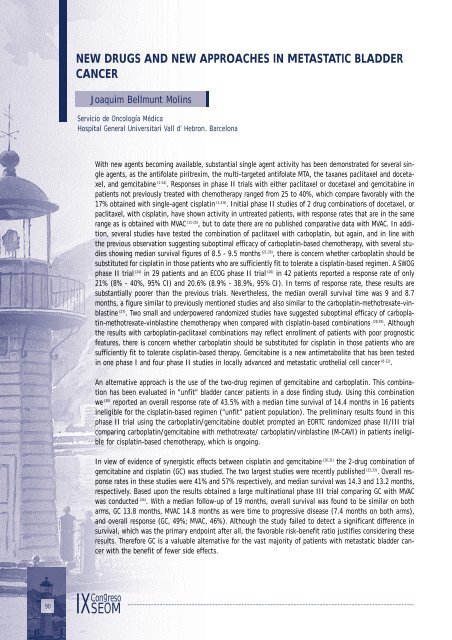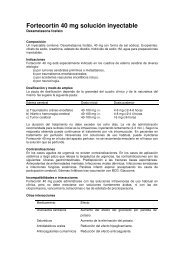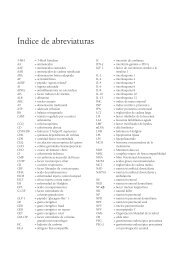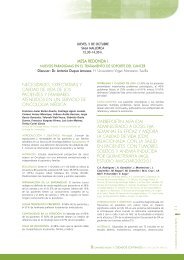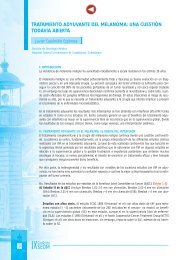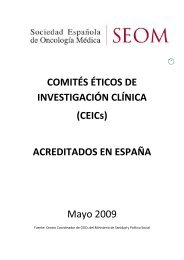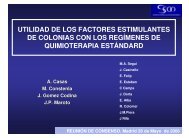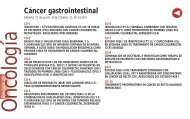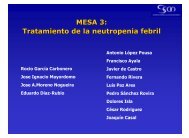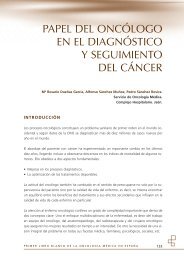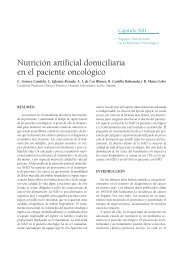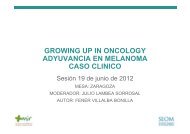Resúmenes de Ponencias - Sociedad Española de OncologÃa Médica
Resúmenes de Ponencias - Sociedad Española de OncologÃa Médica
Resúmenes de Ponencias - Sociedad Española de OncologÃa Médica
Create successful ePaper yourself
Turn your PDF publications into a flip-book with our unique Google optimized e-Paper software.
NEW DRUGS AND NEW APPROACHES IN METASTATIC BLADDER<br />
CANCER<br />
Joaquim Bellmunt Molins<br />
Servicio <strong>de</strong> Oncología Médica<br />
Hospital General Universitari Vall d’ Hebron. Barcelona<br />
With new agents becoming available, substantial single agent activity has been <strong>de</strong>monstrated for several single<br />
agents, as the antifolate piritrexim, the multi-targeted antifolate MTA, the taxanes paclitaxel and docetaxel,<br />
and gemcitabine (1-14) . Responses in phase II trials with either paclitaxel or docetaxel and gemcitabine in<br />
patients not previously treated with chemotherapy ranged from 25 to 40%, which compare favorably with the<br />
17% obtained with single-agent cisplatin (1,3,6) . Initial phase II studies of 2 drug combinations of docetaxel, or<br />
paclitaxel, with cisplatin, have shown activity in untreated patients, with response rates that are in the same<br />
range as is obtained with MVAC (15-20) , but to date there are no published comparative data with MVAC. In addition,<br />
several studies have tested the combination of paclitaxel with carboplatin, but again, and in line with<br />
the previous observation suggesting suboptimal efficacy of carboplatin-based chemotherapy, with several studies<br />
showing median survival figures of 8.5 - 9.5 months (21-26) , there is concern whether carboplatin should be<br />
substituted for cisplatin in those patients who are sufficiently fit to tolerate a cisplatin-based regimen. A SWOG<br />
phase II trial (24) in 29 patients and an ECOG phase II trial (26) in 42 patients reported a response rate of only<br />
21% (8% - 40%, 95% CI) and 20.6% (8.9% - 38.9%, 95% CI). In terms of response rate, these results are<br />
substantially poorer than the previous trials. Nevertheless, the median overall survival time was 9 and 8.7<br />
months, a figure similar to previously mentioned studies and also similar to the carboplatin-methotrexate-vinblastine<br />
(27) . Two small and un<strong>de</strong>rpowered randomized studies have suggested suboptimal efficacy of carboplatin-methotrexate-vinblastine<br />
chemotherapy when compared with cisplatin-based combinations (28,29) . Although<br />
the results with carboplatin-paclitaxel combinations may reflect enrollment of patients with poor prognostic<br />
features, there is concern whether carboplatin should be substituted for cisplatin in those patients who are<br />
sufficiently fit to tolerate cisplatin-based therapy. Gemcitabine is a new antimetabolite that has been tested<br />
in one phase I and four phase II studies in locally advanced and metastatic urothelial cell cancer (8-12) .<br />
An alternative approach is the use of the two-drug regimen of gemcitabine and carboplatin. This combination<br />
has been evaluated in "unfit" blad<strong>de</strong>r cancer patients in a dose finding study. Using this combination<br />
we (30) reported an overall response rate of 43.5% with a median time survival of 14.4 months in 16 patients<br />
ineligible for the cisplatin-based regimen (“unfit” patient population). The preliminary results found in this<br />
phase II trial using the carboplatin/gemcitabine doublet prompted an EORTC randomized phase II/III trial<br />
comparing carboplatin/gemcitabine with methotrexate/ carboplatin/vinblastine (M-CAVI) in patients ineligible<br />
for cisplatin-based chemotherapy, which is ongoing.<br />
In view of evi<strong>de</strong>nce of synergistic effects between cisplatin and gemcitabine (26,31) the 2-drug combination of<br />
gemcitabine and cisplatin (GC) was studied. The two largest studies were recently published (32,33) . Overall response<br />
rates in these studies were 41% and 57% respectively, and median survival was 14.3 and 13.2 months,<br />
respectively. Based upon the results obtained a large multinational phase III trial comparing GC with MVAC<br />
was conducted (34) . With a median follow-up of 19 months, overall survival was found to be similar on both<br />
arms, GC 13.8 months, MVAC 14.8 months as were time to progressive disease (7.4 months on both arms),<br />
and overall response (GC, 49%; MVAC, 46%). Although the study failed to <strong>de</strong>tect a significant difference in<br />
survival, which was the primary endpoint after all, the favorable risk-benefit ratio justifies consi<strong>de</strong>ring these<br />
results. Therefore GC is a valuable alternative for the vast majority of patients with metastatic blad<strong>de</strong>r cancer<br />
with the benefit of fewer si<strong>de</strong> effects.<br />
90<br />
Congreso<br />
IXSEOM


